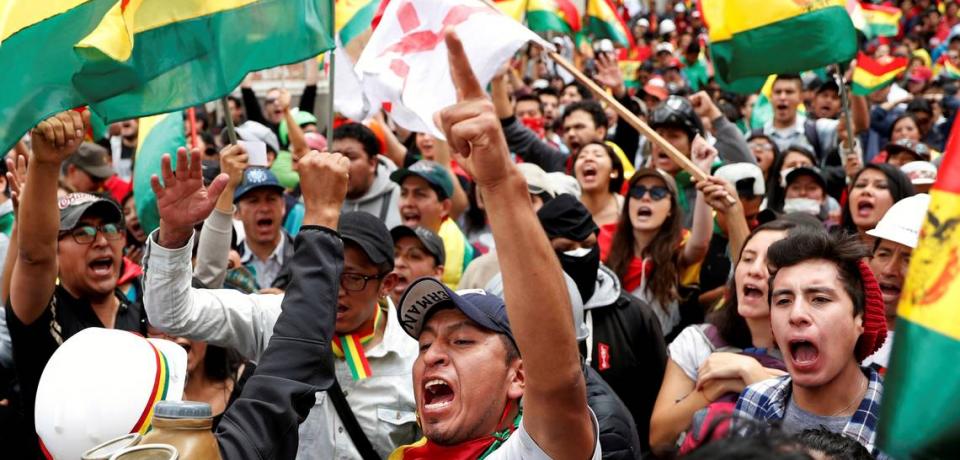
This is no time for misrepresentation. Bolivia is suffering a brutal and violent coup d’état organized by a racist extreme right, which has begun to recover a political space and social backing in recent months in the Andean country. We denounce this coup and express our full solidarity with the Bolivian people!
In the early 2000s, Bolivian social movements in the countryside and cities, led by indigenous peasants, built a long and arduous process of struggle against neoliberal measures, which accentuated the country’s extreme poverty by privatizing everything, including water. Little by little, an anti-neo-liberal consensus was formed in the Andean country, and the right lost ground. Then Evo Morales, at the head of the MAS emerged as an electoral alternative to the regime. There was a pulsating, lively and intense process of mobilization and debate that brought Morales and García Linera to power in 2006. Bolivia’s history was changing, and a constituent Assembly with indigenous present and activity was formed, which shaped the Constitution that would transform Bolivia into a Plurinational State. In 2008, the extreme right, formed mainly by oligarchies of white landowners, attempted a coup d’état by blocking the approval of the new constitution. Pressure and popular mobilisation were immense, and the Constitution was promulgated in 2009. A moment of intense dispute over hegemony thus closed and a period of greater stability began under the leadership of the MAS.
With the favourable international economic and political context, Bolivia laid the foundations for economic stability with growth, income distribution and poverty reduction. These were little affected by the international crisis of 2008, which brought so many negative consequences for the world and for Latin America. During the years of Evo’s government, Bolivia transformed its state structure to broaden the forms of participation of indigenous peoples, quadrupled its GDP, reduced extreme poverty from 35.2% to 15.2%, and was the fastest growing country in the region. However, little by little, both because of the country’s structural limits and because of management errors, the so-called process of change began to show its limits. The tension between rhetorical well-being and a developmental and extractivist project led to serious crises in the government and the loss of support from its bases, as early as 2012. In addition to that, the difficulty of leadership renewal also reinforced the difficulty of sustainability of that process over time.
In Bolivia, the new constitution (promulgated in 2009 during Evo’s first term) allows only one re-election. However, it was understood that Evo’s first term, initiated under the previous constitution, did not count. He was therefore “elected for the first time under the new constitution” in 2009. He was then re-elected in 2014. Theoretically, he could no longer be a candidate. With the difficulty of renewing the leadership, the MAS proposed a referendum to decide if he could try again, and in 2016 Evo was defeated in the vote, his candidacy was prevented. He appealed to the Supreme Court and had his application approved. Under these conditions of attrition, in 2019, he was a candidate against Carlos Mesa, one of the bastions of neoliberalism that had been defeated in 2005 by social mobilizations. Evo won the first round of the elections in a poorly conducted and confusing process, and the opposition accused him of fraud. The OAS, with a political position to the right, has suggested new elections. Under pressure, Evo Morales accepted. But the extreme right has dealt a sinister blow.
The Bolivian extreme right, which had been defeated in 2008, returned with all its strength in an international context favourable to it, with Trump as president of the United States and Bolsonaro governing Brazil. Led by Fernando Camacho, a Christian fundamentalist, she gradually managed to convince the military to join the coup, and that decided the process.
There is no doubt that the equivocations of Evo Morales, García Linera and the MAS in leading the Bolivian change process contributed to the creation of conditions of social dissatisfaction and the construction of “democratic” arguments for the coup right. However, the coup did not take place because of the errors of Evo’s government, but to counteract its achievements and its symbolic weight: social inclusion, autonomy and the emancipation of so many native peoples, the reduction of inequalities and poverty.
The method used to force the resignation of the president was violence, with the burning of houses of relatives and sympathizers, rape and public humiliation. Shortly after the resignation, the violence is continuing and all supporters of Evo Morales are under threaten. There are reports of forced “disappearances” and arbitrary detentions. It is a classic coup d’etat, with a coalition of police, military and civic committees.
Evo Morales and his co-religionists do not deserve to be arrested or persecuted. The Bolivian population has suffered too much historically. We want and will contribute to them gaining the strength to recover their country. All solidarity with the Bolivian people, all solidarity with Evo Morales and his comrades, all solidarity with Bolivia. May the wind that brought the coup not last for long and may the Bolivian people recover the country. The struggle never ends!
They shall not pass!
Executive Bureau of the Fourth International
14 November 2019